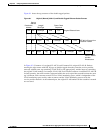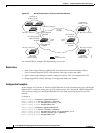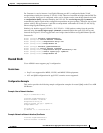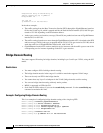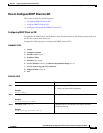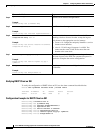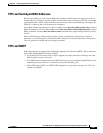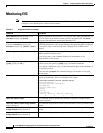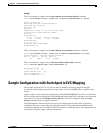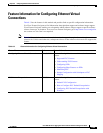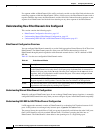
8-29
Cisco ASR 901 Series Aggregation Services Router Software Configuration Guide
OL-23826-09
Chapter 8 Configuring Ethernet Virtual Connections
Sample Configuration with Switchport to EVC Mapping
Example
This is an example of output from the show ethernet service instance detail command:
Router# show ethernet service instance id 1 interface gigabitEthernet 0/1 detail
Service Instance ID: 1
Associated Interface: GigabitEthernet0/13
Associated EVC: EVC_P2P_10
L2protocol drop
CE-Vlans:
Encapsulation: dot1q 10 vlan protocol type 0x8100
Interface Dot1q Tunnel Ethertype: 0x8100
State: Up
EFP Statistics:
Pkts In Bytes In Pkts Out Bytes Out
214 15408 97150 6994800
EFP Microblocks:
****************
Microblock type: Bridge-domain
Bridge-domain: 10
This is an example of output from the show ethernet service instance statistics command:
Router# show ethernet service instance id 1 interface gigabitEthernet 0/13 stats
Service Instance 1, Interface GigabitEthernet0/13
Pkts In Bytes In Pkts Out Bytes Out
214 15408 97150 6994800
This is an example of output from the show mac-address table count command:
Router# show mac address-table count bridge-domain 10
Mac Entries for BD 10:
---------------------------
Dynamic Address Count : 20
Static Address Count : 0
Total Mac Addresses : 20
Sample Configuration with Switchport to EVC Mapping
This example illustrates EVC in a UNI layer, 802.1q tunnelling towards aggregation and QoS
classification with marking and policing at ingress port. A two level HQOS policy is applied on the
ingress.
In this example, all the switchport configurations of the ME3400/MWR2941 have been converted into
EVC based equivalent configuration for GigabitethErnet interface 0/0. This is the ingress port connected
to the nodes. So, instead of switchport access vlan there is an EVC configured using the service
instance command under the physical interface.
The GigabitethErnet interface 0/9 has the egress port configuration which has 802.1q tunnelling
configured. This port is connected to the aggregation device. This is the fundamental difference in
configuration between the Cisco ME34xx devices and the Cisco ASR 901 router. All configurations can
be modelled along this sample working configuration.



